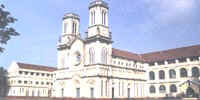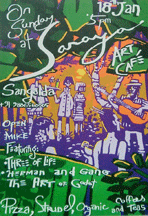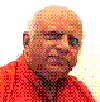Introduction

In the 1600s South Canara, on the western coast of Karnataka, came under the jurisdiction of the Archdiocese of Goa, while the territory to its south known as Malabar belonged to the Archbishopric of Cranganore. St. Francis Xavier was at Cannanore in Malabar, for a few hours, but there is no evidence for the popular tradition that he preached in Canara. The Franciscans seemed to have done the pioneer work who early in the sixteenth century had founded several mission stations along the west coast of India; and the number of Christians was augmented by migrations from Goa.
In the seventeenth century, on account of the decline of the Portuguese supremacy in India, Canara seems to have had a paucity of resident clergy to minister to the faithful. As a consequence the Holy See placed the area under the already existing Carmelite Vicar Apostolic of Malabar. Between 1685 and 1712 some Oratorians were working in the districts, of whom the chief was the Ven. Joseph Vas. In 1764
Canara came under Hyder Ali of Mysore, whose attitude towards the Christians while was favourable, his son and successor Tippu Sultan (1782-1799) who had an antipathy towards the British, suspected the Christians as collaborators of these foreigners and showed motivated by political strategy, took the Christians captive. A few on the outskirts of Mangalore, managed to escape and remained free, others escaped to the hills in the Coorg and to those parts of the district free of persecution. Meanwhile the area continued to remain under the Carmelite Vicar Apostolic of Verapoly (Malabar) whose jurisdiction comprised not only South but also North Canara (Sunkery or Karwar mission) while Coorg fell to the lot of the vicar Apostolic of the Great Mogul at Bombay.
In 1838, in consequence of the brief "Multa Praeclare", and its definitive restriction of the Padroado jurisdiction, rivalry and discord was renewed between the Propaganda (Rome) and Padroado (Portuguese Jurisdiction) parties. In 1840 the people of Canara hoped to put an end to these dissentions by petitioning for a separate vicariate; but the movement was opposed by the Carmelite vicar Apostolic. In 1845 the Vicariate of Verapoly was divided into three parts (Quilon, Verapoly and Mangalore) and the pro-vicar Apostolic appointed for Mangalore was a Carmelite, Father Bernardine of St. Agnes. In 1853 South Canara was made into a separate vicariate but remained under Italian Carmelite rule until 1858, when it was transferred to the French Carmelites, and finally in 1878 to the Jesuits.
On the formation of the hierarchy in 1886 Mangalore became a bishopric, which in 1893, together with Trichinopoly, was made suffragan to Bombay. Msgr. Nicholas Pagani, S.J., 1885-95 (became first bishop in 1886). Fr, Abundius Cavadini S.J., 1885-1910 was involved in the building of institutions of the Mangalore Diocese.: St. Aloysius's College, Mangalore, affiliated to Madras University, the only First Grade College on the Malabar Coast with Classes from elementary to B.A. taught by Jesuit Fathers and lay-teachers; providing boarding house for out of town students and hostels for non-Catholic students. Many non-Christian pupils of various castes and creeds were among the pupils.
St. Joseph's Seminary, Jeppu, began with 43 seminarians under Jesuit professors;
St. Joseph's Asylum work-shops at Jeppu, Mangalore; with three orphanages at Mangalore, and two at Cannanore and Calicut.
Fr. Muller's Kankanady Hospital, Leper Asylum and other medical facilities.
The Cloistered Carmelite Convent at Kankanady with 16 choir-nuns. 5 law-sisters, and 4 tourières.
The finest buildings in the diocese are St. Aloysius's college and church, St. Joseph's seminary, and the (Gothic) convent of Cloistered Carmelite Nuns.
ST JOSEPH'S INTER DIOCESAN SEMINARY
St Joseph's Inter-diocesan Seminary, Mangalore, was first established in 1763 at Monte Mariano, some 13 kms east of Mangalore town. However, during the captivity of Kanara Catholics under Tippu Sultan in 1784, the seminarians were dispersed or sent to Verapoly and for the next few decades, there is no record to show that a Seminary existed in Mangalore. However, in 1843, a certain Fr Pius Noronha was said to have been the Rector of the Seminary at Monte Mariano. In 1845, when the Carmelites took over the care of the Church in Mangalore, they gathered the candidates to the priesthood in a house which was then situated in the locality which is now St Anne's Convent. This Seminary was then transferred to Sunkery, some 5 kms east of Karwar. It was again brought back to Monte Mariano. Finally, a plot of land was acquired at Jeppu, where a large house with a chapel was built as a residence of the Bishop and also for the seminarians. Now the convent of Sisters of Charity, Jeppu, stands in that place.
In 1870, there were 34 priests and 12 seminarians in Mangalore. The Jesuits took over from the Carmelites in 1878, and the very first act of the new Vicar Apostolic, Mgr Nicholas Pagani, was to reorganize the Seminary. Hence the present St Joseph's Seminary came into being on 11th January 1879. During the hundred years and more of its existence, the Seminary has trained a large number of seminarians belonging to several dioceses of India. Initially started as the Diocesan Seminary of Mangalore, the Seminary became an Inter-diocesan Institution when the Mangalore diocese was bifurcated into Mangalore and Calicut dioceses in 1923. When the Seminary celebrated its centenary, not of its establishment, but of its reorganization under the Jesuits, the then superior General of the Jesuits, Fr Pedro Arrupe, visited the Seminary on 11 January 1980, and, on that occasion uttered these prophetic words: "We are aware that the goal or future of our work for the seminaries is to be achieved under the direction of the Bishops and of the secular clergy, because, as the Council says, if it is possible, it is good to have Bishops and secular clergy forming the secular priests who obviously know what they require." Moved with this desire to facilitate the assumption by the diocesan clergy of their rightful role in the formation of the diocesan seminarians, the Karnataka Jesuit Province through their Superior General, requested the Sacred Congregation for the Evangelization of Peoples to be relieved of the administrative responsibility of the Seminary. By its Decree dated 15 July 1992, the Sacred Congregation for the Evangelization of Peoples authorized the transfer of administration of the Seminary from the Society of Jesus to the Inter - diocesan (Mangalore & Calicut) Board of Administration with effect from 1st June 1995. First of June 1995 went down as a great event in the history of St Joseph's Inter - diocesan Seminary. On that day the Society of Jesus who had carefully looked after the formation of the Students for priesthood for 116 years, handed over the administration to the diocesan clergy of Mangalore and Calicut. Another milestone in the history of our Seminary was the completion of 125 years of its existence on the 11th January 2004. The appropriate celebrations of this great event have goaded the entire Seminary community on to march forward with the greater commitment and determination towards the formation of future priests.
This Seminary has given the Indian Catholics many bishops and archbishops. among whom are Archbishop Vincent Concessio, of New Delhi, Bishop Patrick Nair of Meerut and late Bishop Sylvester Monteiro of Aurangabad. Their spiritual and intellectual natures were nurtured by the devout priests who imparted knowledge and spirituality to them, which has stood them well through the present day.
Service for the Church:St Joseph's Inter-diocesan Seminary prepares candidates to the Priesthood, Three Years of Philosophy and Four Years of Theology Courses, leading to the conferring of the Degree of Bachelor of Theology (B.Th.), by the Urban University, Rome, to which the Seminary is affiliated. Conditions and Requirements to pursue the programme mentioned above : The Lecture schedule is confined to the forenoons with FOUR hours of classes. The afternoons are allotted either for subsidiary subjects or research work. A visiting professor may also be given these hours for the completion of his course. III Year Philosophers and II & III Year Theologians are expected to go through one Seminar every year, leading to writing a Paper, combining both academic research and personal reflection. .1 The Themes will be fixed by the Dean of Studies with a guide from among the resident professors, if need be from the Visiting, but residing in the town. 1. B. Th. and Comprehensive : These are conducted towards the end of the IV Year Theology, consisting of both written and oral. 1. The Seminary Library contains about 50,000 volumes of various disciplines, especially on Theology, Philosophy, Spirituality, Bible, Liturgy, Canon Law, Catechetics, etc. Besides it also has national and international reviews on the above subjects, with back numbers bound, numbering about 150 in all, and in various languages, both Indian and foreign. EXTENSION PROGRAMMES |
St. Joseph Interdiocesan Seminary, Jeppu, Mangalore - 575 002
Welcome to Mangalore & Udupi
The diocese of Mangalore comprises the South Kanara district of Karnataka and the Kasargod district of Kerala State. Geographical area : 8,425.01 sq.km. Total Population : 37,44,513 Catholics : 3,40,654 Diocesan Priests 64 Religious Priests 102 Religious Brothers 17 Religious Sisters 439 Seminarians (Major 52 Minor 22) 74 Parishes 140 Sub-stations 25 Hospitals 10 Beds 1280 Dispensaries 14 Children's Homes (Orphanages) 23 Inmates 575 Leper Asylum 1 Inmates 115 Lower Primary & Higher Primary Schools 144 Students 66240 High Schools 61 Students 28176 Junior Colleges 3 Students 1620 Colleges 10 Students 14370 Homeo Medical College 1 Students 236 Training Schools 3 Students 282 School of Nursing 1 Students 132 College of Nursing 1 Students 199 Training College Students 108 Technical Schools 12 Students 1618 Back to Top Back to Top Bishop Victor R. Fernandes succeeded Bishop Valerian in 1931 and reigned over Mangalore for 24 years. He gave priority for the primary education and Sunday Catechism. During his tenure, religious orders of Olivet Brothers, Ursulines, Bethany Sisters were established. He built the presbytery for the retired priests. He was succeeded by Bishop Basil Peris and Bishop Raymond D'Mello for short periods.
Pope Pius XI divided the Diocese in 1923 and appointed Fr Valerian D'Souza, one trained in St Joseph's Seminary, as the first native Bishop on February 28, 1928. Mangalore under the local Bishops: During the tenure of Msgr Pagani, Mangalore became the field of hectic activity. St Joseph's Seminary, St Aloysius College, Fr Muller's Hospital, St Joseph's Workshop, Codialbail Press and orphanages were established by him. On November 25, 1885, Msgr Pagani was consecrated as Bishop at Cathedral and on January 25, 1887, Mangalore was declared an independent diocese. Formation of the Diocese: During the regime of Carmelites, the Mangalorean Christians constantly sent memorandums to the Holy See to send Jesuits to Mangalore to start Institutions for higher education. So after the death of Bp Mary Ephrem, Rome studied the situation and handed over the Mangalore mission to the Jesuits of Naples who reached Mangalore on 31st December 1878 under the leadership of Msgr Nicholas Pagani. Two more Jesuits from Bombay joined the original group of six among whom Bishop Pagani, Rev Augustus Muller, Rev Angelo Maffei and Rev Urban Stein are famous. Jesuits in Mangalore: When the political situation in Portugal was in turmoil, Msgr Antonio Carvalho arrived at Goa without being consecrated as Bishop. So many parishes in South Canara did not accept the leadership of Carvalho but submitted to the Vicar Apostolic of Verapoly. The parishes in Mangalore were divided into two groups. To ward off this sad state, Mangalore Christians, under the leadership of Fr. Joachim Pius Noronha, requested the Holy See to establish Mangalore as a separate Vicariate and sent Msgr Bernadine, a Carmelite, as the Pro-Vicar Apostolic of Mangalore. After him, Bp Michel Antony and Bp Mary Ephrem looked after the spiritual well-being of Mangalore Catholics. All the three Bishops gave special attention in training the local clergy. Mary Ephrem was instrumental in bringing the Cloistered Carmel and the Tertiaries (Apostolic Carmel sisters) to Mangalore. Mangalore under the Verapoly Carmelites:
The Captivity (1784-1799): During the time of Tippu there were at least 27 Churches and a Seminary in Canara. Tippu ordered that all the Churches be demolished and the property of Christians be taken to Srirangapattanam. Accordingly nearly 40,000 people were taken as captives to Mysore from South Canara through the Jamalabad fort route. A number of people died on the way due to hunger, disease and ill treatment by the soldiers. Those who resisted were thrown down from the Jamalabad Islam. Those who resisted the brutish behavior of the soldiers, were tortured by cutting off their noses and ears and paraded in the city. Only after the death of Tippu, in 1799, the Christians returned, only to find that their property had been confiscated.
The Christians started to build the churches and by 1815 most of the churches were rebuilt. In the eighteenth century when Bednore rulers became weak, Hyder Ali captured Bednore and then the factory of the Portuguese at Mangalore and renamed it as Couriel (Fort of the King). Hyder Ali had respect for the Christians and Fr. Joachim Manuel Miranda was a friend of Hyder. However, Christians in general hated him for they had to pay heavy tax for king's treasury.
Later the British captured Couriel and the Christians helped the British by giving them rice, vegetables and money.
When Tippu came to power, he decided to come heavily upon the Christians. Christians during the time of Hyder Ali and Tippu Sultan: At the recommendation of the Vicar General of Verapoly, Msgr. Sebastiani, Pope Clement X appointed Thomas de Castro, a Theatine priest, as the Vicar Apostolic of Canara on 30th August 1675 to remedy the sad state of the Canara Christians. After his consecration, he came first to Calicut and then to Mangalore (1677-1684) and in 1680 he built conflict with Rome for disregarding the Padroado and so did not cede the jurisdiction to Thomas de Castro. Instead, they appointed Fr. Joseph Vaz as the Vicar Forane of Canara and he was asked not to submit to Bishop Castro unless he showed the letter of appointment. Fr. Joseph Vaz was a saintly man, worked as a zealous missionary and he submitted to Bisho Castro. Bishop Thomas Castro as the Vicar Apostolic of Canara: The Portuguese supported the mission activity under the Padroado (Protectorate: privileges) in Canara. However the arrival of the British and the Dutch gave a blow to the activity of the Portuguese and gradually the Portuguese were unable to send the required number of missionaries to Mangalore.
The appointment of the Vicar Apostolic of Mangalore was felt to be the need of the hour. Shivappa Naik, the king of Bednore, pressurized that a native priest be chosen as the Vicar Apostolic. So Fr. Andrew Gomez was appointed as the Vicar Apostolic but before the nomination papers could reach Mangalore, Fr. Gomez died. Padroado and Canara Christians: We have no evidence that St. Francis Xavier came to Mangalore, though he laboured in Goa. The ancestors of many Mangalore Christians are Goans who were welcomed by the Hindu rulers of Bednore for their skill in agriculture. Others came to Mangalore to escape the trials of inquisition and also to avoid the constant raids of the Marata rulers.
| < Prev | Next > |
|---|
















